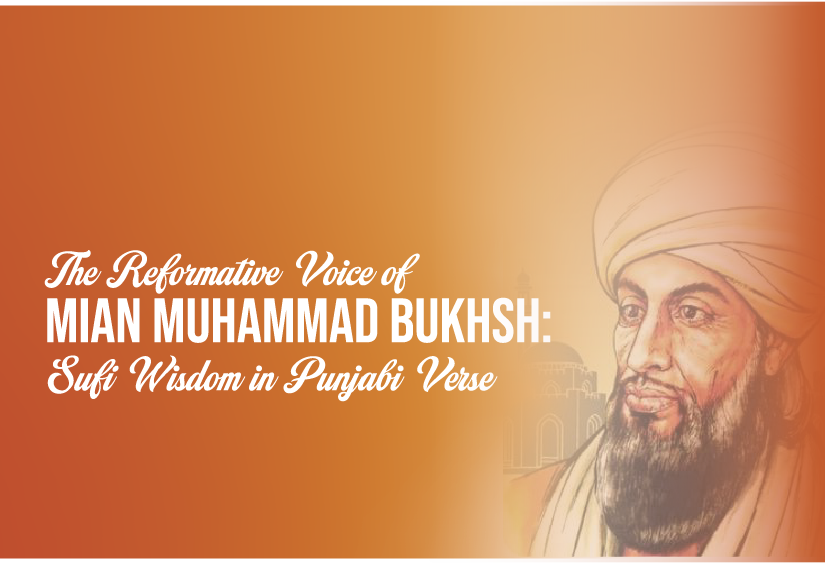
Article by
Mian Muhammad Bukhsh (1830–1907) stands as an eminent figure in Punjabi Sufi poetry, celebrated for his masterful blend of poetic beauty, spiritual insight, and reformative wisdom. Born in the village of Khari Sharif, near Mirpur in present-day Pakistan-administered Kashmir, Mian Muhammad Bukhsh composed verses that carried a profound moral and ethical message, often mixed with themes of divine love and human connection. His poetry, particularly his magnum opus Saif-ul-Muluk, has echoed deeply across generations and cultural boundaries, offering guidance for individual and societal reform.
Saif-ul-Muluk: A Journey of Spiritual Awakening
Mian Muhammad Bukhsh’s most celebrated work, Saif-ul-Muluk, is a long mystical poem that follows the journey of a prince named Saif-ul-Muluk, who embarks on a quest for his beloved fairy, Badi-ul-Jamal. While it appears to be a simple love story on the surface, the poem is deeply allegorical, with each episode symbolizing stages of spiritual awakening. In Bukhsh’s world, the fairy represents divine beauty and truth, while the protagonist’s journey reflects the soul’s quest for the ultimate truth, leading to union with the Divine.
Through Saif-ul-Muluk, Bukhsh subtly encourages readers to introspect, urging them to navigate the inner struggles of pride, jealousy, and worldly desires to find peace and unity with the Divine.
Saif-Muluk ander Rab paya buhta asar danai.
Tez tabiat, hosh wadiat, fehm aqal, chitrai
God bestowed wisdom upon Prince Saif-ul-Muluk. He was clever, nimble, and sharp-minded, always quick to act and think.
Emphasis on Reform and Moral Conduct
One of Mian Muhammad Bukhsh’s distinctive contributions to Sufi literature is his emphasis on social reform through individual transformation. He believed that societal progress could only occur when individuals embraced values like kindness, honesty, humility, and patience. His poetry is filled with themes that encourage readers to act as agents of change, not just for personal gain but for the benefit of the community.
Je lakh zuhd, ebadat kariay, bin ishqun kis kari
Jan, jan ishq na saray tainun, ta,ta nibhay na yari
Without divine love, your prayers are meaningless. If the passionate fire of love does not burn within your heart and soul, you will never be able to truly connect with the beloved reality.
The Role of Compassion and Empathy
Bukhsh’s poetry often emphasizes compassion and empathy as cornerstones of a just society. In a world prevalent with divisions based on caste, creed, and wealth, Bukhsh’s verses call for an egalitarian outlook, encouraging people to look beyond superficial distinctions and see the divine spark in every individual. His poetry champions the value of love and compassion in everyday interactions, advocating for a world where people lift each other up rather than compete against each other.
Bal charagh ishq da, maira roshan kr de seena
Dil de deevay di rushnai, javay vich zameenan
Kindle the flame of love and illuminate my heart. May the glow of this humble lamp enrich the world with its light.
Humility as the Path to Divine Grace
Mian Muhammad Bukhsh’s poetry places a high value on humility, an essential trait for anyone seeking spiritual fulfillment. He saw humility not only as a personal virtue but as a form of respect toward the Divine, recognizing that all human achievements are ultimately granted by a higher power. His poems encourage readers to adopt an attitude of gratitude and humility, avoiding pride and arrogance, which he warns can lead to spiritual downfall.
A recurring theme in his work is the notion that humility brings one closer to the Divine. He frequently contrasts humble, self-effacing individuals with the arrogant, illustrating that only through modesty can one gain inner peace. This message challenges the reader to reject societal norms that often equate success with self-importance and encourages a gentler, more introspective approach to life.
Loran wala reeha na khali lor keeti jis sachi
Lor karaind jo mur aya, lor ohdi gin kachi
If someone does not attain the ultimate truth, it is evident that either their effort lacks persistence or they lack divine guidance or spiritual insight.
The Enduring Relevance of Mian Muhammad Bukhsh’s Message
In an era where personal success is often measured by material wealth and social standing, Mian Muhammad Bukhsh’s poetry offers a refreshing reminder of the timeless values that lead to true fulfillment. His verses, brimming with wisdom and compassion, call on readers to embrace a life of simplicity, humility, and service to others. Bukhsh’s poetry is not limited by religious or cultural boundaries; its messages of love, unity, and morality are universal, appealing to anyone in search of a more meaningful life.
 Monthly "Azeem English Magazine", launched in 2000, records the information about diverse fields like mental health, literature, research, science, and art. The magazine's objective is to impart social, cultural, and literary values to society.
Monthly "Azeem English Magazine", launched in 2000, records the information about diverse fields like mental health, literature, research, science, and art. The magazine's objective is to impart social, cultural, and literary values to society.
+92 51 88 93 092
First Floor, RAS Arcade, Eidhi Market, Street#124, G-13/4, Islamabad, Pakistan, 44000.